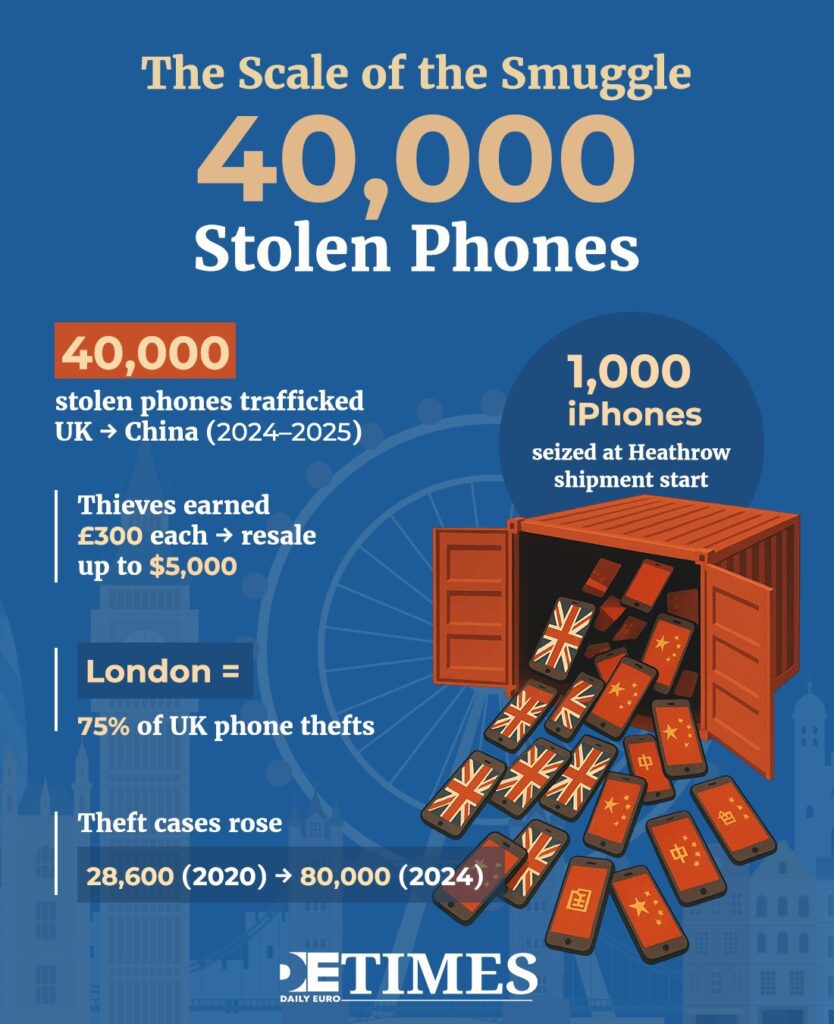Police in London recently broke up a criminal group that smuggled up to 40,000 stolen phones from the UK to China over a year.
The investigation started when customs officers found a thousand iPhones at Heathrow Airport on their way to Hong Kong.
Street thieves got paid up to £300 per phone, while these devices could sell for as much as $5,000 in China. The Metropolitan Police described this as the biggest crackdown on phone theft ever seen in Britain.
Theft Follows Trade Routes
Phone theft in London nearly tripled from 28,600 cases in 2020 to over 80,000 in 2024.
London now accounts for 75% of all phone thefts in the UK.
The criminal network police dismantled was behind 40% of stolen phones in London. Organised gangs focus on Apple products because they fetch higher resale prices in Asian markets.
Hotspots like Westminster attract concentrated criminal activity. The money involved incentivizes theft, creating challenges too large for individual police forces to handle alone.
Components Take Similar Routes
In April 2025, Britain banned exporting video game controllers to Russia after learning they were being used to control drones. However, this ban was implemented too late.
Over 100,000 Western-made parts appeared in drones and missiles used in recent conflicts.
These components come from companies across the U.S., China, Taiwan, Britain, Germany, Switzerland, Japan, South Korea, and the Netherlands. What were once entertainment controllers now guide weapon systems.
The government imposed 150 new trade restrictions on electronics, chemicals, metals, and machinery linked to Russian defense sectors, responding to long-standing problems.

Europe Builds Coordination Britain Left Behind
In October 2023, the European Commission released the first combined list of member states’ export controls. Now, countries within the EU can demand authorizations for exports covered by other members’ control lists.
This includes Dutch controls on semiconductor-making machines and Spanish restrictions on quantum computing, 3D printing, and other new technologies. Britain used to be part of these coordination efforts.
Before 2021, EU export controls mainly relied on broad multilateral agreements like the Nuclear Supplier Group and the Wassenaar Arrangement. The new system allows quicker reactions to new security threats.
Intelligence Sharing Shapes Results
After Brexit, Britain left the EU frameworks that enabled fast sharing of info on illegal trade. Customs databases no longer connect automatically, and warning systems work separately.
The phone smuggling ring that moved 40,000 devices took almost a year to investigate and shut down.
Previously, European customs networks helped spot suspicious shipments faster across borders.
Britain still has bilateral intelligence agreements but lacks the comprehensive coverage that EU-wide systems provide. Criminal networks exploit these gaps between countries.
Technology Moves Faster Than Bureaucracy
Finding a thousand stolen iPhones in a warehouse triggered Operation Echosteep. Detectives usually working armed robbery and drug cases took on the investigation.
Phones keep their value even when stolen, and cloud services remain accessible. Secondary markets operate worldwide with little friction.
The Metropolitan Police called on manufacturers like Apple and Samsung to improve security and reduce the ability to reuse stolen devices. Industry cooperation is vital for enforcement to work on a large scale.
Sovereignty Has Measurable Costs
Brexit gave Britain regulatory independence, but it also meant shouldering full responsibility for maintaining security systems alone.
Coordinated export controls need regular intelligence sharing and harmonized enforcement. The 27 EU members now run a unified system to spot and block sensitive technology flows.
British authorities face these problems on their own. The 40,000 stolen phones are one clear example. The flow of drone components to conflict zones is another.
Europe’s economic security framework, developed after 2021, addresses threats Britain also encounters. Geography and trade routes connect the UK to continental supply chains, regardless of political borders.
Markets Ignore Political Borders
Criminals seek profit wherever enforcement is weakest. A phone stolen in Westminster can reach Hong Kong via intermediaries within days.
Game controllers made for fun end up flying military drones. The distinction between dual-use and consumer goods disappears when resale networks operate globally.
One man was arrested at Heathrow after flying over 200 times between London and Algeria, carrying stolen phones, iPads, laptops, and Rolex watches. Enforcement alone cannot match the scale of organised crime.
Coordination Requires Institutional Commitment
The EU system lets member states apply export controls on new technologies flagged by others. Dutch restrictions on semiconductors automatically inform enforcement priorities across the bloc.
Britain must now build individual agreements to achieve similar coordination, which requires separate negotiations and slows response times.
Phone theft numbers show one consequence. The movement of technology to sanctioned parties shows another. Both expose weaknesses in the system that once connected UK enforcement with European networks.
Trade in stolen goods and illegal components follows economic incentives. Political boundaries do not stop these flows. Effective enforcement depends on rapid and wide-reaching information sharing.
Britain chose sovereignty. The effects appear in customs warehouses and crime statistics.
Forty thousand stolen phones tell part of the story. The rest moves inside shipping containers that authorities cannot monitor alone.
Keep up with Daily Euro Times for more updates!
Read also:
Beyond Brexit: Why Europe Needs the Best of British
Britain Closes Its Doors, Portugal Follows
Britain vs Big Tech: Can the Online Safety Act Really Govern the Internet






